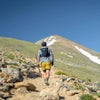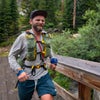The Rise. The Shine. featuring Jason Hardrath
The Rise. The Shine.
The Rise. The Shine. featuring Jason Hardrath
2023 / 5 mins
Scale Washington’s 100 highest peaks in 51 days? How about summiting California’s fifteen mountains—towering at 14,000-foot-plus—in less than a week? NBD, says Vuori Collaborator, Jason Hardrath, the climber who has faced incredible odds to break more than 100 fastest known times around the world—and built a following by making the impossible possible with every single step.
We caught up with Hardrath immediately following his biggest achievement yet—the Rocky Mountain Grand Slam, a 122-peak route he completed in just under 40 days, the fastest known time (or FKT to those in the community). Not bad for a self-described “ADHD little kid that couldn't sit still” and always got into trouble at school.


“I thrived in environments where there was movement and competition and play,” Hardrath, who teaches elementary school PE during his time away from the trail, shares. “And that became the forum where I built an identity of success, a positively oriented identity in my life, from a very early age.” For Hardrath, every goal has led into the next—from that first, seemingly impossible six-minute mile in middle school, accomplished when he barely squeaked onto the team, to today’s eye-watering peaks celebrated by the global climbing community. In developing what he calls a competition mindset with himself, he’s created a legacy defined by pushing through limits. “Step out,” urges Hardrath. “Run the experiment, be bold, go do the thing. Because it's better to go really live than to never live at all. To this day, that's a big part of my mindset.”
In 2015 it looked like it might all end, when he experienced a nearly fatal car accident when he was ejected from the vehicle. Healing from a collapsed lung and damaged internal organs, along with multiple other injuries, his doctors told him that if he hadn’t been in such incredible shape, preparing for Ironman, he would surely have lost his life that day.
“Instead of qualifying for Kona that year,” recalls Hardrath, “I went from being able to bike 140 miles on that Sunday to not being able to get a drink of water on that Wednesday.” With a life defined by physical activity and the outdoors, Hardrath suddenly found himself disconnected and lost. When his doctor urged him to let go of his triathalon goals, something awakened within him. “On one hand there was a sort of darkness and sinking feeling. And on the other hand, this spirit of defiance.”


It started with smaller goals. First, the simple act of swimming was a major milestone, executed while Hardrath’s ribs were still healing. He got himself swimming further each week than he’d had while he was training for Ironman, even though it had always been his least favorite discipline. Then he discovered that while he was still healing, he could still hike up and downhill, which led to him developing his mountaineering. Key to his success at this time, he explains, was not allowing himself to live within the shadow of his previous accomplishments. “One of the mindset things I did is to refer to anything that happened before the car accident, as my former life … he passed away in that accident, super cool that he got to do what he did… Instead of always measuring [myself] by the gap of, well, I used to be able to run 26 miles in under three hours.”
Today, he’s bringing his community along with him in real time, having shared the journey towards the Rocky Mountain Grand Slam on social media. Though he smashed the previous record of 60 days, the journey was not without unprecedented challenges, even for the experienced mountaineer. Along the way, Hardrath faced altitude sickness and storms, team members bailing out in the midst of the journey, and even marmots eating his sleeping bag, which led to him essentially sleeping on the ground for the majority of the climb. For Hardrath, the struggle is a key part of the achievement. “We don’t’ step into adventure with the desire to [only] feel the good. We’re here to feel it all. By nature of making space for those feelings, you are bigger than those feelings,” he says. For Hardrath, the community element is just as important as achieving his personal goals. He hopes to inspire others to dream big and push past their own limits.


“I firmly believe that adventure is an imperative for us becoming the humans we’re meant to be—stepping into a grand experiment in any area of life… is essential to being alive,” says Hardrath. “I’m a participant in this eternal game of men and mountains… and I’m an ambassador of experience. The real goal of it is to share… The real value of what I’m doing isn’t that I did it, it’s that I now have permission to turn around and help others and tell others… That is what makes it worth it to keep climbing when the storms are coming.”
Which summit is next? Surely he’ll dream up another one. Hardrath promises, “What I'm not going to be done with is chasing big, audacious goals that make me feel alive.” Following his huge accomplishment, Hardrath will spend the last few weeks before school starts resting and recovering—a bit. He’s also going to help friends reach their own climbing goals. After all, he’s used to keeping moving.


“I definitely cried in the finish line in the dirt,” he shares, recalling racing through the finish line with his father waiting for him there. “You spend so much of the time just battling with complete unknown… There was a lot of pride and satisfaction knowing that the job was well done.”
For Hardrath, the struggles and unexpected setbacks along the journey are an essential part of the reason why he does what he does every day—and hopes others will be motivated by his journey. “Let me invite you into your own adventure,” he says. “If we’re stacking things up to what we love regardless of setbacks and hardships and losses, then we can do the math: Was today worth it? Then we can say yeah.”